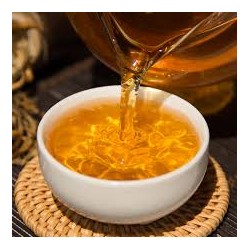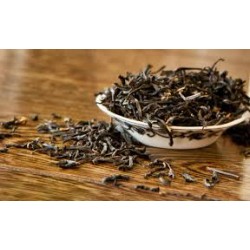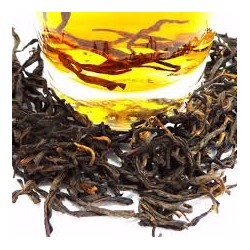No products
Prices are tax included
Generality
"Black tea" is the name given to tea leaves subjected to a particular process and from which infusion we obtain a dark-red drink, also called black tea.
The black one is a tea subjected to greater oxidation than the oolong varieties, green and white has a stronger and stronger flavor and aroma than the less oxidized teas.
Despite the inc...
Generality
"Black tea" is the name given to tea leaves subjected to a particular process and from which infusion we obtain a dark-red drink, also called black tea.
The black one is a tea subjected to greater oxidation than the oolong varieties, green and white has a stronger and stronger flavor and aroma than the less oxidized teas.
Despite the increase in sales for green and white tea, black tea still accounts for more than 90% of all tea sold in the West.
Names of black tea
In Chinese and in the languages of neighboring countries, black tea is known as "red tea" because of the color the liquid takes after infusion. The western term "black tea", instead, refers to the color of the raw material.
Black tea plant
All four types of tea are made from the leaves of the homonymous plant (or small tree) Camellia sinensis.
On the other hand, this botanical species is cultivated in two different varieties and with relatively specific uses:
Chinese plant C. sinensis subsp sinesi: with small leaves and used for the other three types of tea;
Assamese plant C. sinensis subsp assamica: with large leaves and used mainly for black tea, although in recent years it has also been used for green and white.
processing
After harvesting, the fresh leaves of the assa- racy are first dried, then rolled on themselves, then dried again and then macerated.
The crumbling steps lead to the release of cellular juices and particular enzymes (polyphenol oxidase), which mainly act in the next phase, where the actual fermentation takes place (at 30 ° C for 0.5-2 hours).
The last step involves a further drying to destroy the enzymes and block the catalytic processes, stabilizing the product. The humidity is thus reduced to values below 5% and the black tea takes on its characteristic aroma and a typically dark color.
Property
The chemical characteristics of black tea are influenced not only by the raw material, but also by the time of infusion. This parameter is important not only to increase or decrease the aroma of the drink, but also to allow a greater or lesser solubilization and perfusion of the stimulants and tannins from the leaves of black tea to water.
Black tea and stimulants
Due to the presence of active nerve ingredients, the infusion of black tea acquires stimulating, exciting and diuretic properties.
Caffeine in black tea
Although with the exceptions, black tea represents the richest tea variety in caffeine (3-6% on dry weight) and - if it were not for the different extraction method - it would even exceed the coffee.
In a cup of black tea (about 150 ml) obtained by infusion of 5 minutes, the caffeine content (improperly called teina) varies on average from 40 to 100 mg; a respectable quantity, considering that an espresso contains up to 80 mg.
Theophylline in black tea
Black tea is also rich in theophylline, a substance similar to the one just described that is used - in significantly higher concentrations - in the treatment of asthma and bronchitis. Theophylline, in fact, favors the dilatation of the bronchi, improving - among other things - also the contractility of the diaphragm and of the other respiratory muscles.
Theobromine in black tea
Another substance with similar activities is the theobromine, typical alkaloid of cocoa, which in the black tea is however present in rather limited quantities.
Black tea and antioxidants
Polyphenols in black tea
Black tea, like other varieties, is also rich in polyphenols.
Polyphenols are nutritional factors with antioxidant action, which prevent cardiovascular diseases and tumors. Abundant especially in green tea, as they suffer negatively the oxidative effect during production.
Tannins in black tea
Black tea also contains tannins, which possess many of the metabolic characteristics of generic polyphenols.
In addition, tannins have astringent properties, because they reduce glandular secretion in the intestine by fighting diarrhea.
Black tea and Health
Black tea and cancer
Despite the high concentration of antioxidants, a meta-analysis of observational studies in Asian or Caucasian populations concluded that:
"The consumption of black tea does not affect the development of oral cancers, esophageal cancer, prostate cancer and lung cancer".
Black tea and stroke
On the other hand, consumption of black tea may be associated with a decreased risk of stroke.
Black tea, pressure and cholesterol
A Cochrane review conducted in 2013 on randomized trials over 3 months concluded that:
"Consumption of black tea in the long term only slightly reduces systolic and diastolic blood pressure (about 1-2 mmHg)."
The same work also noted that:
"The long-term consumption of black tea lowers the blood concentration of LDL cholesterol by 0.43 mmol / L (or 7 , 74 mg / dL) but, overall, this research remains inconclusive
"Taken from http://www.my-personaltrainer.it/integratori/te-nero.html
Black Tea There are 3 products.
-
SINGLE BUD BLACK TEA AROMATIC BOUQUET
The Bud Black single tea is the classic European black tea.
€0.50In Stock -
SPECIAL SONG ZHEN BLACK TEA WOOD FLAVOR...
Special Song Zhen Black Tea, pamper yourself with a cup of black tea and let your mind and body benefit from the wholesome experience.
€0.50In Stock -
TEA OLD TREE BLACK SMOKED BUT FROM THE...
Old Tree Black Tea light smoky note, has a distinct body and elegant, strong but with a fruity finish.
€0.50In Stock




